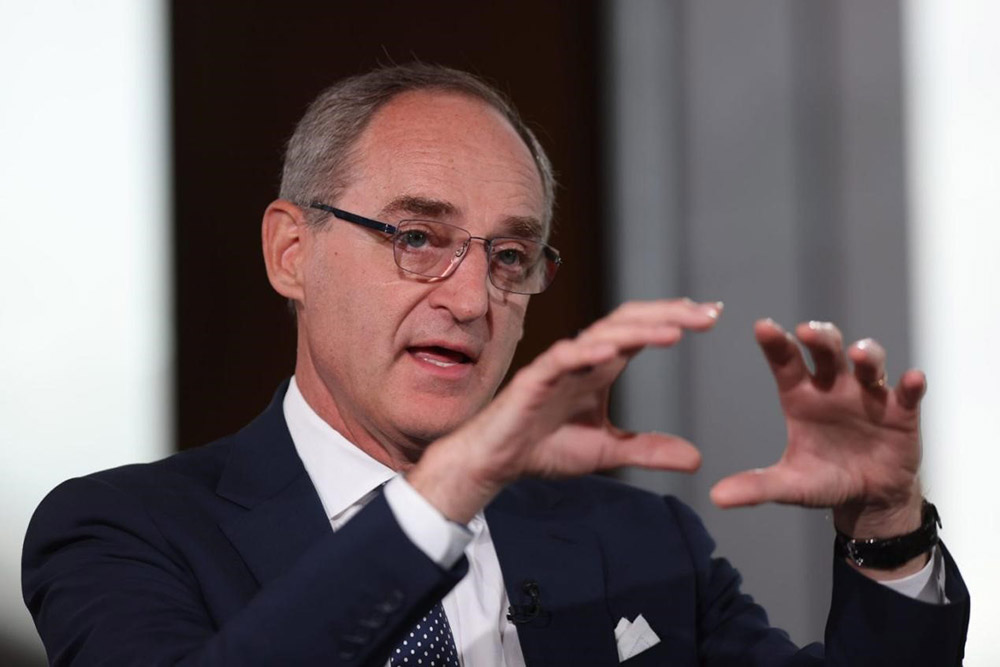
• 拉夫·劳伦(Ralph Lauren)首席执行官帕特里斯·卢维从不回避直面职场问题。这位法籍高管坦言,尽管他更倾向于在提供反馈时关注员工的优势,但及时指出不足同样有利于公司和员工事业的蓬勃发展。
如今执掌一家《财富》美国500强公司绝非易事,但适度的刚柔并济才是长久经营之道。
对拉夫·劳伦首席执行官帕特里斯·卢韦特而言,这意味着在提供负面反馈时,必须开门见山直奔主题。
卢韦特在LinkedIn《This is Working》播客中表示:“若员工存在重大问题,应该直截了当地指出问题。有时人们需要当头棒喝,因为温言软语未必能点醒梦中人。”
这位60岁的掌门人表示,对于屡次错过关键节点等严重问题,必须态度严厉,但对于诸如条理性欠佳等非原则性瑕疵,他会先着重肯定员工的优势,然后再提供改进建议。
卢韦特表示:“要以创造发展机遇作为出发点向员工提供反馈。”卢韦特自2017年起执掌该时尚品牌。他补充道,这是他在宝洁(Procter & Gamble)近三十载职业生涯中领悟到的管理智慧。
他说道:“你必须把大部分时间投入到自己擅长的事情上。比如将80%的时间投入优势领域,20%的时间用于处理机会。如果将所有时间都花在补足短板上,可能导致效率低下。”
提供反馈没有定式
对于员工而言,正向反馈可能提高工作效率。近期一项调查发现,约75%的职场人士渴望在工作中获得更多价值认同。特别是对于初入职场适应困难的Z世代而言,明晰他们的能力缺口,能帮助他们避免成为最先被裁员的对象。
然而在积极与消极反馈间把握分寸,仍是多数管理者面临的难题。仅14%的《财富》美国500强公司高管承认,公司能准确识别高效与低效员工。为此,部分公司领导者选择以独特方式,向员工传达工作评价。
全球最大加密货币交易所币安(Binance)前首席执行官赵长鹏奉行“灵光乍现即刻反馈”的原则。
2022年,赵长鹏在一篇博客中写道:“我更喜欢当众提供反馈,这样做既能让旁人借鉴,也能免去重复劳动。不少人坦言在最初几次以这种方式收到反馈时倍感震惊,但最终都习以为常。”
波音(Boeing)首席执行官凯利·奥特伯格则以直率著称,据传他曾要求员工停止抱怨、专注超越空客(Airbus)。
《华尔街日报》获得的会议录音显示,奥特伯格告诫同事:“别在茶水间议论是非,聚焦当下的任务。”
在芯片巨头超威半导体(Advanced Micro Devices,AMD),员工甚至可能在午夜后收到首席执行官苏姿丰的反馈邮件。
苏姿丰在接受《时代》杂志专访时表示:“我不信领导者是天生的。领导力源于后天锤炼。” (财富中文网)
译者:刘进龙
审校:汪皓
• 拉夫·劳伦(Ralph Lauren)首席执行官帕特里斯·卢维从不回避直面职场问题。这位法籍高管坦言,尽管他更倾向于在提供反馈时关注员工的优势,但及时指出不足同样有利于公司和员工事业的蓬勃发展。
如今执掌一家《财富》美国500强公司绝非易事,但适度的刚柔并济才是长久经营之道。
对拉夫·劳伦首席执行官帕特里斯·卢韦特而言,这意味着在提供负面反馈时,必须开门见山直奔主题。
卢韦特在LinkedIn《This is Working》播客中表示:“若员工存在重大问题,应该直截了当地指出问题。有时人们需要当头棒喝,因为温言软语未必能点醒梦中人。”
这位60岁的掌门人表示,对于屡次错过关键节点等严重问题,必须态度严厉,但对于诸如条理性欠佳等非原则性瑕疵,他会先着重肯定员工的优势,然后再提供改进建议。
卢韦特表示:“要以创造发展机遇作为出发点向员工提供反馈。”卢韦特自2017年起执掌该时尚品牌。他补充道,这是他在宝洁(Procter & Gamble)近三十载职业生涯中领悟到的管理智慧。
他说道:“你必须把大部分时间投入到自己擅长的事情上。比如将80%的时间投入优势领域,20%的时间用于处理机会。如果将所有时间都花在补足短板上,可能导致效率低下。”
提供反馈没有定式
对于员工而言,正向反馈可能提高工作效率。近期一项调查发现,约75%的职场人士渴望在工作中获得更多价值认同。特别是对于初入职场适应困难的Z世代而言,明晰他们的能力缺口,能帮助他们避免成为最先被裁员的对象。
然而在积极与消极反馈间把握分寸,仍是多数管理者面临的难题。仅14%的《财富》美国500强公司高管承认,公司能准确识别高效与低效员工。为此,部分公司领导者选择以独特方式,向员工传达工作评价。
全球最大加密货币交易所币安(Binance)前首席执行官赵长鹏奉行“灵光乍现即刻反馈”的原则。
2022年,赵长鹏在一篇博客中写道:“我更喜欢当众提供反馈,这样做既能让旁人借鉴,也能免去重复劳动。不少人坦言在最初几次以这种方式收到反馈时倍感震惊,但最终都习以为常。”
波音(Boeing)首席执行官凯利·奥特伯格则以直率著称,据传他曾要求员工停止抱怨、专注超越空客(Airbus)。
《华尔街日报》获得的会议录音显示,奥特伯格告诫同事:“别在茶水间议论是非,聚焦当下的任务。”
在芯片巨头超威半导体(Advanced Micro Devices,AMD),员工甚至可能在午夜后收到首席执行官苏姿丰的反馈邮件。
苏姿丰在接受《时代》杂志专访时表示:“我不信领导者是天生的。领导力源于后天锤炼。” (财富中文网)
译者:刘进龙
审校:汪皓
• Ralph Lauren CEO Patrice Louvet isn’t afraid to tackle workplace issues head-on. Although he prefers to focus on employees’ strengths when giving feedback, the French-born exec says addressing weaknesses sooner rather than later can help businesses—and careers—thrive.
Being the chief executive of a Fortune 500 company isn’t easy these days, but sometimes a little tough love can go a long way.
For Patrice Louvet, the CEO of Ralph Lauren, that means when it’s time to give negative feedback, you just have to cut to the chase.
“If there’s a big issue, then you’ve got to start with the issue, and go straight on,” Louvet told LinkedIn’s This is Working podcast. “And sometimes people need to be hit by a 2×4 across the forehead, because it doesn’t always register right.”
While major problems like regularly missing crucial deadlines may require a stern hand, the 60-year-old said that he handles smaller issues that aren’t overly disruptive, like being unorganized, by focusing on the worker’s strengths before laying it on thick.
“Provide the feedback through the lens that these are opportunities for development,” Louvet, who’s led the fashion brand since 2017, added—and it’s a lesson he said he learned during his nearly 30-year tenure at Procter & Gamble.
“You have to spend the majority of your time on your strengths,” Louvet said. “So 80% of your time on your strengths, 20% on your opportunities. If you spend all your time on your opportunities, you’re not going to be that effective.”
The best way to provide employee feedback isn’t cut and dry
For workers, reinforcement can be a productivity make-or-break. A recent study found that some 75% of workers wish they felt more valued at work. For Gen Z, in particular, who have had a tough time adjusting to the workplace, understanding their skill gaps can help them avoid being on the early chopping block.
However, striking the appropriate balance between positivity and negativity is a challenge for many leaders, with only 14% of Fortune 500 executives admitting their companies know who the high and low performers are. Some leaders have, in turn, opted for unique approaches to letting their subordinates know their views on their work.
For billionaire Changpeng Zhao, former CEO of the world’s largest crypto exchange, Binance, that’s “whenever and wherever the thought comes up.”
“I in fact prefer to give feedback in large groups, so that other people can learn too and I don’t have to repeat myself many times,” Zhao wrote in a blog post in 2022. “Many people told me they were shocked the first few times when receiving feedback like that, but got used to it eventually.”
Boeing’s CEO, Kelly Ortberg, also took a blunt approach, reportedly telling employees to stop complaining and focus on beating Airbus.
“Don’t sit at the water cooler and bitch about people,” Ortberg told his colleagues, according to a meeting recording obtained by The Wall Street Journal. “Let’s focus on the task at hand.”
At chipmaker Advanced Micro Devices (AMD), workers may even receive feedback from CEO Lisa Su after midnight.
“I don’t believe leaders are born, Su told Time. “I believe leaders are trained.”






